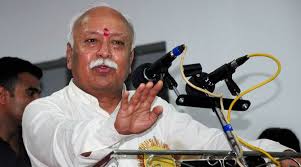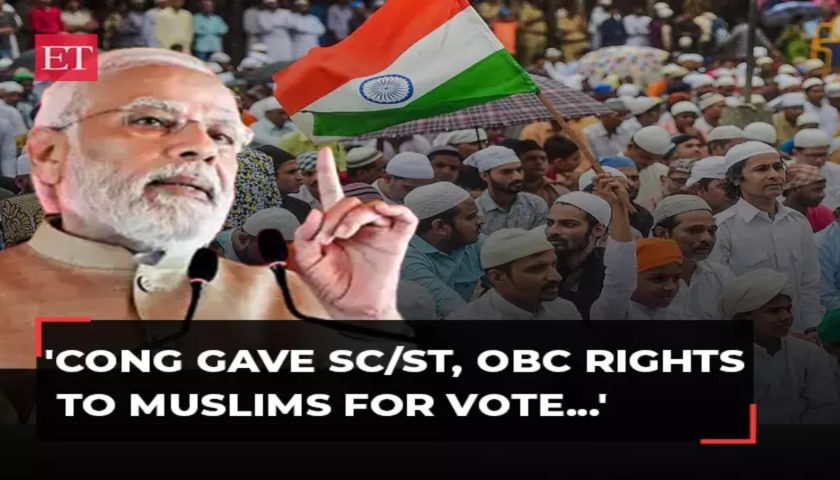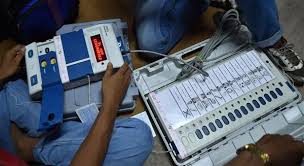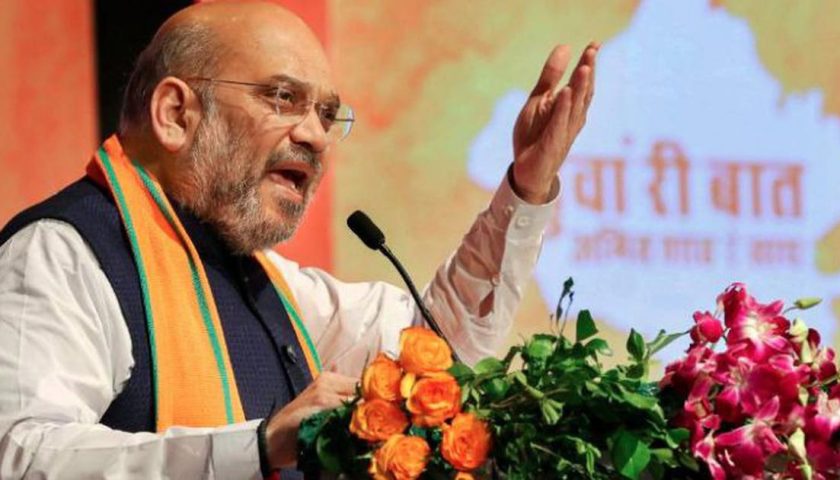RSS Chief Mohan Bhagwat in his Vijayadashami Speech asked the cow protectors to not worry over “well-intentioned statements by highly placed persons in the government or remarks made by the Supreme Court”.
Kashmir, Rohingya, cow protection, economy, Kerala, Bengal and nationalism — the annual Vijayadashami speech of Rashtriya Swayamsevak Sangh chief Mohan Bhagwat touched on most topics dominating political discourse today. The speech — marking the Right-wing organisation’s foundation day — is considered an ideological statement, which various Sangh Parivar affiliates follow in forming their action plan.
Cow
Gau rakshaks (cow protectors), who are “piously involved” in protecting the bovine, got Bhagwat’s backing, as he distinguished between them and the “criminals… involved in violent activities”.
“It is unfair to link the cow protectors or entire activity of cow protection with violent incidents or communal feelings without knowing or neglecting the facts,” said Bhagwat, adding, “Many followers of the Muslim faith are also involved in… cow protection, cow promotion and management of gaushalas.”
Holding the cow as an object of “reverence”, Bhagwat blamed the “nefarious campaign going on against the cow-protection” for “unnecessarily” creating “tension among the people of different religions”.
He asked the cow protectors to not worry over “well-intentioned statements by highly placed persons in the government or remarks made by the Supreme Court”.
Bhagwat’s remarks come two years and a day after Muhammad Akhlaq was lynched on the suspicion of having eaten beef, by the villagers of Dadri, in Uttar Pradesh. Since then hundreds of incidents of violence in the name of cow protection have been reported from across the country. In July this year, taking note of the incidents of cow vigilantism, the Supreme Court had asked the states to check such violence.
Bhagwat, however, said only people who are “criminals” and “involved in violent activities should be bothered about that”.
“Vested interests are misinterpreting these statements to influence the larger public opinion,” said Bhagwat, and asked the government to “stay away from such misinterpretation” and ensure that “criminals get penalised and the innocents are not troubled”.
“The legal and virtuous work of cow protection and cow promotion will go on in the interest of the people and will increase in coming days,” he said.
Kashmir
Bhagwat called for “constitutional amendments” for the residents of Jammu and Kashmir to be “assimilated with the rest of Bharat”. The RSS and the BJP have historically opposed the constitutional provisions given to Kashmir — Article 370 that grants special autonomous status to the state and Article 35A that lets the state legislature define ‘permanent residents’ of Jammu and Kashmir, providing them special rights and privileges.
On Tuesday, J&K’s deputy chief minister, Nirmal Singh, said that as a BJP member repealing Article 370 remained dear to his party, which is part of the PDP-led coalition government in the state.
Bhagwat blamed “discriminatory provisions in the state of Jammu and Kashmir” for denying the people living in the “miserable state of refugees” their fundamental rights.
These refugees, according to him, are the generations who decided to stay in Bharat and remain Hindu.
“The problems of permanent residents of state who migrated from Pakistan occupied Jammu-Kashmir in 1947 and the people who were displaced from the Kashmir valley in 1990 are remaining as they were. We have to create conditions so that our these brothers can lead a happy, dignified and secure life like other Indians by availing equal democratic rights and fulfilling democratic duties, even while remaining firm and devoted to their religions and national identity,” said Bhagwat.
For this, the “old provisions” will have to be changed.
The RSS chief called for “transparent and clean administration in the entire state of Jammu and Kashmir”.
He appreciated the “determination with which terrorist infiltration and firing from across the border are being dealt with” and how the “provocative actions and the propaganda of separatists is been effectively controlled by curbing their illegal financial sources”. “The positive effects of strategy to neutralize the terrorists are now visible on the ground,” said Bhagwat.
Rohingya
The Rohingya community got no recognition of refugees needing protection in Bhagwat’s speech. Instead, he compared them to “illegal Bangladeshi migrants” and said Rohingya had “infiltrated” India.
Late August onwards, an estimated 5 lakh members of the Muslim Rohingya community have fled Rakhine, their home state in Myanmar, to escape threats and religious persecution.
Bhagwat, however, said, “Links between Rohingya and Jihadi elements are coming to light.”
“If such elements come to India, they may have an impact on our security situation. Why do the Rohingya want to come to India? We need to study their background. They will not only put pressure on our jobs, resources but will pose a threat to nation’s security. We had not even completely solved the problem of Bangladeshi intrusion when Myanmar’s problems has been heaped on us,” he added.
“They are being driven out of Myanmar mainly due to their continuous violent and criminal separatist activities and linkages with the terrorist groups,” said Bhagwat, dismissing all reports of religious persecution to the community in Myanmar. The United Nations, on Friday, called it a humanitarian and human rights nightmare.
Bhagwat said a decision regarding the community must be made keeping “threat to national security” in mind. He added that the “government seems to be thinking on the same line”, referring to the BJP-led Centre calling them illegal migrants who can be deported.
Bengal and Kerala
Bhagwat took potshots at the two states staunchly resisting the BJP — Bengal, ruled by Mamta Banerjee’s Trinamool Congress and Kerala, headed by the CPI(M). He blamed the state governments and their “systematically politicised administrative systems” for letting “anti-national forces” stimulate “unrest, separatism, violence, enmity or hatred amongst group or local identities on the basis of language, region, sects, religion etc.”
The states, he said, were not only apathetic to this “national crisis” but also “lending a helping hand to the anti-national forces for petty political interests”.
Left-ruled Kerala has long been the ground for violent clashes between workers of the Right wing and the Left party. Reportedly, of the 96 political killings since 1995, 42 were of people associated with the BJP-RSS and 40 of those with the Left. The BJP is now holding campaigns against political violence in the state.
Economy
Bhagwat called for an economic policy that would protect the informal sector and ensure its stability.
“While reforming and cleaning the economic systems, although some tremors and instability is expected, it should be kept in mind that these sectors should feel the minimum heat and ultimately they should get the maximum strength,” he said.
Bhagwat chastised the NITI Aayog-backed economic policies, saying , “Our NITI Aayog and economic advisers of the states will have to come out of the same old economic ‘isms’, and will have to integrate the most up-to-date economic experiences with the ground reality of our nation.”
For the good of this informal economy, the small, medium industry, the cooperative sector, the agro allied sector, he called on people to “relentlessly insist on buying the Swadeshi products while fulfilling their daily needs and doing other purchases.”
Environment
Putting forward India’s leadership role globally, Bhagwat said India stood firm in its international commitments to counter climate change, when even the US “went back on its commitment” to the Paris Accord. The 2016 Paris Agreement — under which UN member nations committed to fighting climate change, through their own nationally determined contributions — suffered a blow this June when US president Donald Trump announced the country’s withdrawal.
Nationalism
Bhagwat built his speech around his definition of nationalism, calling on intellectuals and thinkers to get rid of “the ill-effects of the colonial thought and mindset” that make us “self-abominating, confused and murky”.
“We have forgotten our history and our heritage. People from outside teach us about it and we realise that yes, we are great,” said Bhagwat.
He quoted Sister Nivedita, a British social worker and follower of Vivekananda: “Samaj is the strength of the family. The home is behind the civic life and the civic life sustains the nationality. We have the essentials of all four elements among us, in our ancient Dharma but we have allowed much of their consciousness to sleep. We have again to realize the meaning of our own treasure.”
The western concept of the nation, said Bhagwat, was linked to “power and state”. Indian society, on the other hand, was not an artificial notion but a ‘rashtra’ based on “sanskriti and people.” “Our eternal life values that envision humanity as a global family, is our collective bonding spirit,” he added.
“The society has to stand together for the sake of a proud nation. Only then will the country’s thinkers be free of views with foreign perspectives. A nation is always born, it is not made with artificial practices,” Bhagwat said.






